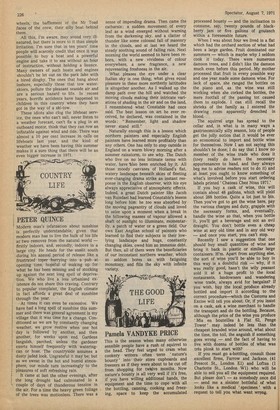Pamela VANDYKE PRICE
This is the season when many otherwise sensible people have a rush of squirrel to the head. They feel urged to cram what cookery writers often term 'nature's bounty' into their store cupboards and freezers as if they were about to be cut off from shopping for twelve months. Now nature's bounty is all very well if it's free, if you have willing additional hands, the equipment and the time to cope with all the bottling, canning, cooking and freezing, space to keep the accumulated processed bounty — and the inclination to consume, say, twenty pounds of blackberry jam or five gallons of goulasch within a foreseeable future.
When I was about four we lived in a flat which had the orchard section of what had been a large garden. Fruit dominated our summers — which is maybe why I seldom cook it today. There were numerous damson trees, and I didn't like the damson much even before this period. My mother processed that fruit in every possible way and one year made some damson wine. For lack of space, she ranged the bottles on the piano and, as the wine was still working when she corked the bottles, the mere footfall of ' the passing tot caused them to explode. I can still recall the shrieks of the family as I entered the drawing room apparently drenched in blood.
The squirrel urge has spread to the cellar and, in what is in many ways a gastronomically silly season, lots of people get the jolly notion that it would be ever so economical to import and bottle wine for themselves. Now I am not saying this shouldn't be done; I do say that I know no member of the wine trade who does it (tney really do have the necessary appurtenances to hand, and they always beg me to advise readers not to do it) and at least you ought to know something of what's involved before you start ordering labels printed 'Chateau Chez Nous 1971.'
If you buy a cask of wine, this will contain about 48 gallons, which will yield about 288 bottles. Quite a lot just to bin. Then you've got to get the wine here, pay the various charges and duty, grapple with the necessary forms, and, eventually, handle the wine so that, when you bottle it, you'll get a beverage and not an evil draught. You don't bottle even a cheap wine at any old time and in any old way — and once you start, you can't stop.
Recently I saw a suggestion that one should buy small quantities of wine and bring it back in plastic or similar large containers. H'm. Apart from anything else, the sort of wine you'll be able to buy in this way is a doubtful risk — why, if it was really good, hasn't the wily peasant sold it at a huge profit to the local restaurants, landowners and wandering wine trade, always avid for bargains? If you wish, buy the local produce already bottled and import it according to the correct procedure—which the Customs and Excise will tell you about. Or, if you insist on a cask, ask a wine merchant to handle the transport and do the bottling. Because, although the price of the wine you produce ' Mis en bouteilles A Flat 62, Penge Tower' may indeed be less than the cheapest branded wine around, what about the time, the toil, the anguish if something goes wrong — and the fact of having to live with dozens of bottles of what was trft plonk to start with?
If you must go a-bottling, consult those excellent firms, Farrow and Jackson (41 Prescot St., London El) and Loftus (1 Charlotte St., London W1) who will be able to sell you all the equipment required. But please don't — as somebody once did — send me a sinister bottleful of what , looks like a medical 'specimen' with a request to tell you what went wrong.


































 Previous page
Previous page